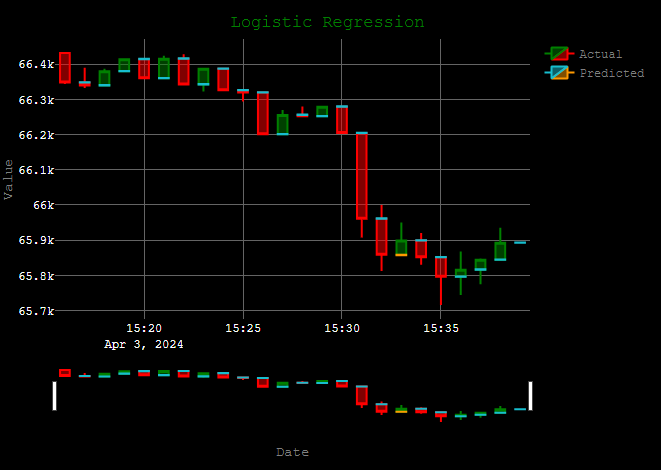A primitive predictor for the price of Bitcoin over 1-minute candlesticks. Due to the lack of proper hardware, this is accomplished using supervised-learning methods only.
-
Live Price Prediction: Predicts the close, low, & high aspects of the current 1-minute candlestick using three supervised models
(
linear regression,elastic net optimized using grid search,logistic regression) running in parallel. -
Web Interface: Web interface that demonstrates the predictions and the actual values visually.
-
Multiprocessing: Runs each model as a separate process to enhance efficiency and serve the live predictions in a timely fashion.
-
Multithreading: API requests are ran in separate threads to save time.
-
Automatic Data Fetching: Uses Kaggle's CroissantML format and other public APIs to automatically download and store the data in parquet format.
-
Web Scraping: Utilizes a Socks-5 proxy through a local TOR browser instance to scrape live news from the DuckDuckGo.
-
Live Sentiment Analysis: The scraped news articles are fed into FinBERT to get live sentiment.
-
Live Data Collection: Live data is collected from various sources including Binance, CoinStats, & YahooFinanace.
The models require two forms of data:
Used for training and testing the models. Handled by the Data module. Sources include:
- Binance
- Yahoo Finance
- CoinStats
- WallStreet Journal
- Macrotrends
- Web Scraping
Used for acquiring the necessary information to predict the targets. Handled by the Observer module. Sources include:
- Binance
- Yahoo Finance
- CoinStats
- Alpha Vantage
- Web Scraping
These various data sources (live and training) were then combined properly into a single Pandas Dataframe and used/saved.
- Install the TOR browser or provide alternative proxies in the
config.json. - Create a
config.jsonfile in the root directory of the project. The structure of the file must match that ofexample_config.json. - [Optional] Create a virtual python environment and initialize it.
- Install the project requirements by running the following command
pip install -r requirements.txt.- Note that this project requires Python 3.11.8 and on some systems you must run
pip3 install -r requirements.txt.
- Note that this project requires Python 3.11.8 and on some systems you must run
- Start TOR, establish the connection, and then search at least once in the search bar for anything.
- Change into the project directory and start the server by
python .orpython3 . - Access the web interface at
https://127.0.0.1:{PORT FROM config.json}.
These screenshots are taken from the latest test run:
MIT License
Copyright (c) 2024
Permission is hereby granted, free of charge, to any person obtaining a copy of this software and associated documentation files (the "Software"), to deal in the Software without restriction, including without limitation the rights to use, copy, modify, merge, publish, distribute, sublicense, and/or sell copies of the Software, and to permit persons to whom the Software is furnished to do so, subject to the following conditions:
The above copyright notice and this permission notice shall be included in all copies or substantial portions of the Software.
THE SOFTWARE IS PROVIDED "AS IS", WITHOUT WARRANTY OF ANY KIND, EXPRESS OR IMPLIED, INCLUDING BUT NOT LIMITED TO THE WARRANTIES OF MERCHANTABILITY, FITNESS FOR A PARTICULAR PURPOSE AND NONINFRINGEMENT. IN NO EVENT SHALL THE AUTHORS OR COPYRIGHT HOLDERS BE LIABLE FOR ANY CLAIM, DAMAGES OR OTHER LIABILITY, WHETHER IN AN ACTION OF CONTRACT, TORT OR OTHERWISE, ARISING FROM, OUT OF OR IN CONNECTION WITH THE SOFTWARE OR THE USE OR OTHER DEALINGS IN THE SOFTWARE.


